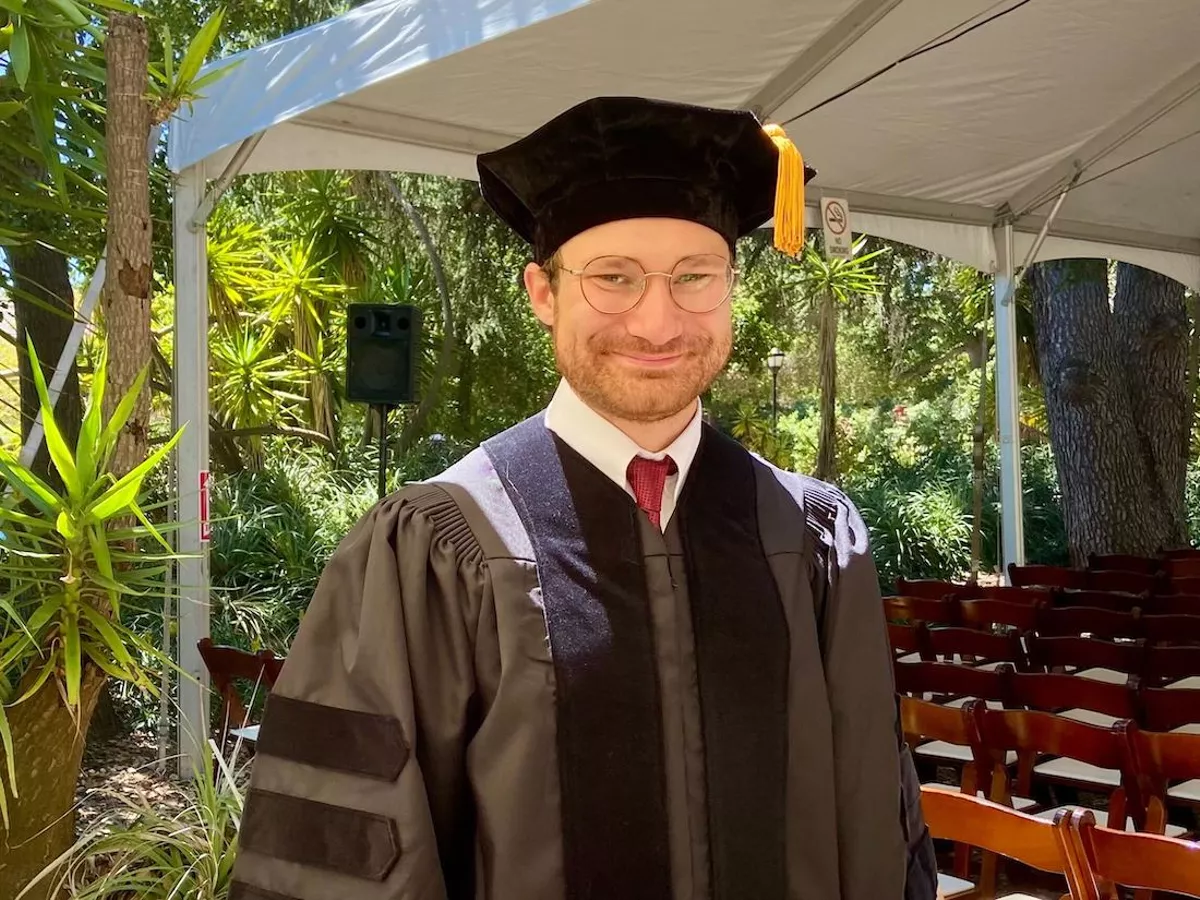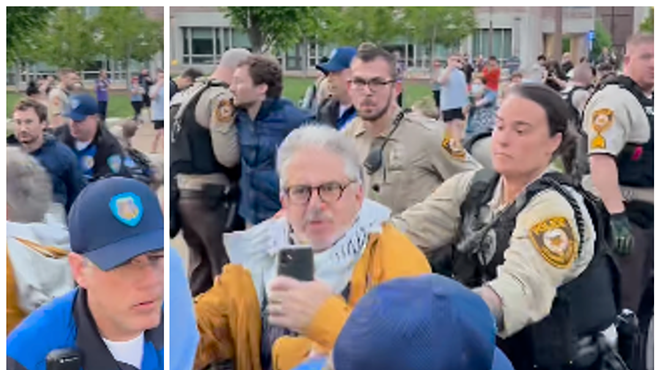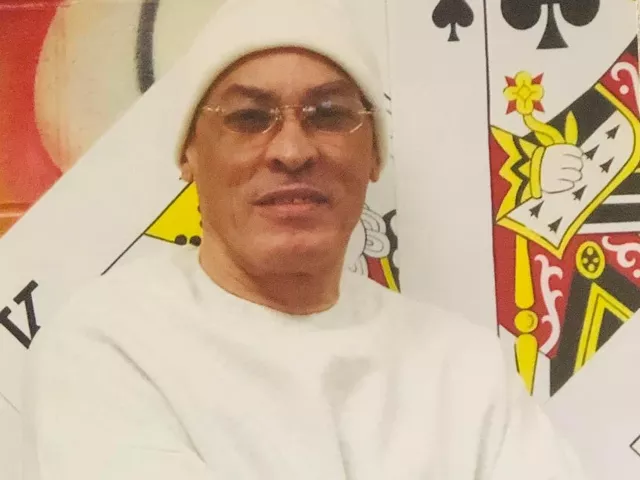Aaron Neiman was excited to move to St. Louis for a job as a lecturer at Washington University.
His position in the anthropology department was his first job after earning his Ph.D.
Before the April 27 protest on campus, he’d accepted a different position with the university, one that would allow him to spend more time on his research.
But the demonstration resulted in more than 100 arrests, including at least four faculty members. Six faculty members including Neiman were suspended from the university, and ordered to have no contact with students or colleagues.
Now he has no idea what will happen to his employment, where he stands with the university, or if he will be able to continue to call St. Louis home.
The Protest
At the start of the afternoon of April 27, Neiman stood under a cluster of trees with students, community members, alumni and other faculty members, protesting Israel’s attacks on Gaza and Wash U’s ties to Boeing.
Neiman himself is Jewish, and sees his actions that day as allied with his heritage.
“I sort of see a through line between participating in the protests and Jewish values as such, you know, the idea that you have a responsibility to go and address wrong that you see in the world,” he says. “Why I attended that day specifically, was to support the students and to try to, if nothing else, show that they had support ideologically and materially, in terms of showing up ... from at least some of their faculty.”
The protestors marched through campus and set up an encampment. Within about 30 minutes, Neiman says, police told protestors to disperse and they moved the encampment.
Police issued several warnings to disperse during the demonstration, but as afternoon turned to evening many police officers left and protestors began eating and praying. Then the officers came back, forming a line in front of the encampment and descended on the group, violently arresting dozens as the protestors locked arms around the encampment.
Neiman was one of the first to be pulled out of the circle and arrested. While Neiman wasn’t injured, the arrest was still violent.
“I was dragged, I was laying on my stomach. I was wearing a windbreaker because it started drizzling. I was picked up from the back by the hood so I couldn't breathe briefly,” he says. Then he was walked to a waiting van for detainees. “It was a very chaotic moment. Lots of other people were also being arrested at the same time.”
They waited in the suffocatingly hot back of the paddy wagon for “at least an hour” as police continued to make round after round of arrest, he says.
The Aftermath
Neiman received his suspension letter from Wash U two days later. The letter from Provost Beverly Wendland is nearly a carbon copy of others shared with RFT and forbids him from contact with faculty or students.
It details some of the terms of his paid administrative leave, and towards the end of the letter includes this line: “Please note it is imperative that you not engage in any act of retaliation against anyone who provides information in connection with the investigation.”
Both Neiman and Brendan Roediger, the attorney advising him and a number of other impacted faculty, say it’s been nearly radio silence from the university since that initial letter.
No hearings have been spoken of or scheduled, Neiman says. On Monday (the same day as the university’s commencement ceremony), he and the other suspended faculty members lost all access to their university systems and email.
Neiman worries about the impact on his students.
“We have a lot of students going to med school, who I've promised letters to, and I outlined in the suspension appeal letter that this would be — they would be essentially collateral damage in this,” he says. “They either read it and didn't care or didn't read it because the email has been shut off.”
On May 7 Neiman sent the university’s Advisory Committee on Academic Freedom and Tenure a letter appealing his suspension. He has not received a response other than an acknowledgement that it had been received.
“This extraordinary punishment threatens to give students and colleagues the false impression that I am being investigated for a much more serious infraction — one that would genuinely threaten the safety of students or colleagues, for example interpersonal violence, verbal abuse, or untoward sexual contact,” he points out in the letter.
Roediger tells RFT that the response from the university and their decision to suspend Neiman is disproportionate given that university policy typically deploys suspension only to those who stand accused of much more serious offenses, such as threats of physical harm, sexual misconduct or being intoxicated on the job. Yet he’s been suspended even though his arrest has yet to result in criminal charges.
“The administration has not yet produced any evidence whatsoever demonstrating either the allegedly imminent threat I posed on April 27, or on the allegedly general threat I pose to the University community as a whole,” Neiman writes in his appeal. “Nor have criminal charges been filed with the relevant authorities on behalf of the Washington University Police Department, nor any of the other police departments involved in making arrests that evening. Indeed, it does not seem that there are any charges to be discussed at all. I urge the administration to substantiate the very serious claims made in Provost Wendland’s letter as soon as possible.”
Neiman adds that it would be wrong to suspend him for any implications that he was specifically dangerous to the Jewish community on campus as he stood with Pro-Palestine protestors because he is Jewish.
“My ancestors include Talmudic scholars, Holocaust survivors, shtetl peasants, and working-class Brooklynites,” he writes. “I was raised Jewish and continue to cherish my Jewish identity, even in these extremely fractured times for our people. I reject any implication that I pose a threat to fellow Jewish students or colleagues as itself an antisemitic negation of my Jewishness.”
Washington University did not respond to requests for comment. Previously, the university has said it cannot discuss personnel matters.
“There's no communication and no sense of what this investigation entails or when it could possibly be over,” Roediger says.
Next Steps
Roediger, a Wash U alum, says the university’s silence and actions at the April 27 protest are new to the institution, but suspensions are not.
“The use of suspensions is sort of one of the primary tools of private universities around the country,” he says, noting that long-term suspensions create less risk for the university.
“It's what [the] general counsel tells universities to do,” he says. “Put folks on paid suspension, make the process as vague and complicated and endless as possible, and in the meantime, we'll figure out what the next steps are. And hopefully some of these people will just go away.”
Roediger takes issue with the university’s demand that suspended faculty have no contact with colleagues and students even off-campus. Roediger says he has never seen a clause like this implemented before, and doesn’t know how it could be.
“It's not illegal to write that in a letter. I don't know how one would enforce it,” he says.
No one knows what comes next, Roediger says.
“Everyone is afraid that they will still be in this status a month from now, two months from now, six months from now,” he says. “That ... what Washington University wants is this: Nobody knows what's happening. Nobody knows what the future holds.”
RFT asked Roediger if he anticipates suing Wash U on behalf of faculty members like Neiman.
“I certainly hope not,” he says. “These are folks who want to get back to serving their students and they want to give back to serving their students quickly. These are folks engaged in extensive research projects that they want to return to. These are not folks that are hungry for litigation. But if Washington University continues in the direction that it's heading, it seems unavoidable.”
Follow us: Apple News | Google News | NewsBreak | Reddit | Instagram | Facebook | Twitter | Or sign up for our RSS Feed




![Wash U Crackdown on Pro-Palestine Protest Results in 80+ Arrests [PHOTOS]](https://media1.riverfronttimes.com/riverfronttimes/imager/wash-u-crackdown-on-pro-palestine-protest-results-in-80-arrests-photos/u/inlineslideshow/42430042/839_washuprotest_042724_zl_53685491970_o.jpg?cb=1714333690)
![Wash U Crackdown on Pro-Palestine Protest Results in 80+ Arrests [PHOTOS]](https://media1.riverfronttimes.com/riverfronttimes/imager/wash-u-crackdown-on-pro-palestine-protest-results-in-80-arrests-photos/u/slideshowthumb/42430021/113_washuprotest_042724_zl_53685404964_o.jpg?cb=1714333340)
![Wash U Crackdown on Pro-Palestine Protest Results in 80+ Arrests [PHOTOS]](https://media1.riverfronttimes.com/riverfronttimes/imager/wash-u-crackdown-on-pro-palestine-protest-results-in-80-arrests-photos/u/slideshowthumb/42430022/138_washuprotest_042724_zl_53685404869_o.jpg?cb=1714333340)
![Wash U Crackdown on Pro-Palestine Protest Results in 80+ Arrests [PHOTOS]](https://media2.riverfronttimes.com/riverfronttimes/imager/wash-u-crackdown-on-pro-palestine-protest-results-in-80-arrests-photos/u/slideshowthumb/42430024/186_washuprotest_042724_zl_53684168817_o.jpg?cb=1714333340)
![Wash U Crackdown on Pro-Palestine Protest Results in 80+ Arrests [PHOTOS]](https://media2.riverfronttimes.com/riverfronttimes/imager/wash-u-crackdown-on-pro-palestine-protest-results-in-80-arrests-photos/u/slideshowthumb/42430025/240_washuprotest_042724_zl_53685035876_o.jpg?cb=1714333340)
![Wash U Crackdown on Pro-Palestine Protest Results in 80+ Arrests [PHOTOS]](https://media1.riverfronttimes.com/riverfronttimes/imager/wash-u-crackdown-on-pro-palestine-protest-results-in-80-arrests-photos/u/slideshowthumb/42430026/266_washuprotest_042724_zl_53685260788_o.jpg?cb=1714333340)
![Wash U Crackdown on Pro-Palestine Protest Results in 80+ Arrests [PHOTOS]](https://media1.riverfronttimes.com/riverfronttimes/imager/wash-u-crackdown-on-pro-palestine-protest-results-in-80-arrests-photos/u/slideshowthumb/42430027/302_washuprotest_042724_zl_53685404809_o.jpg?cb=1714333340)


